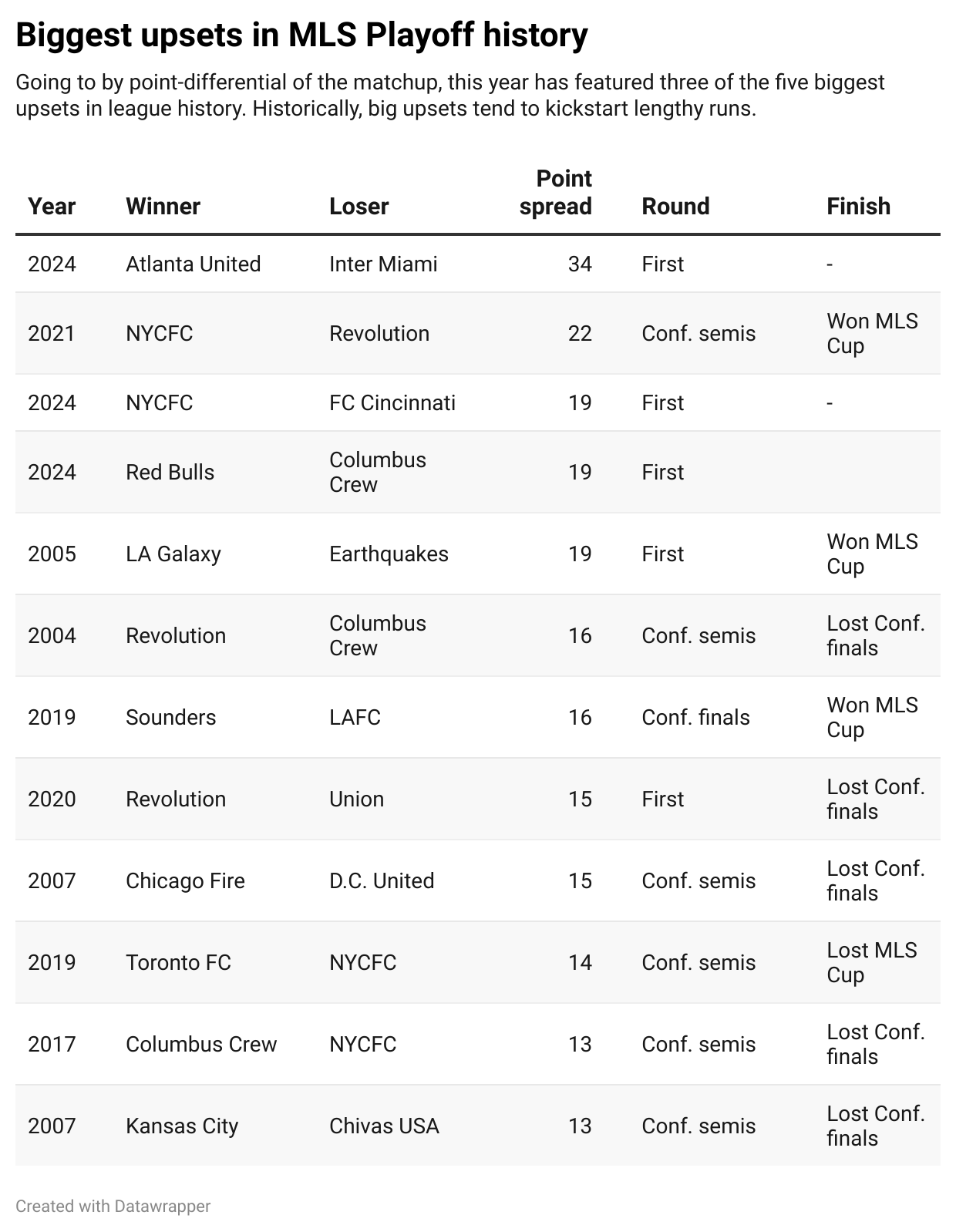The first round of the MLS Cup Playoffs is now officially in the books, and while it definitely didn’t go as planned, I think it also proved to be one of the most entertaining rounds we’ve ever had in the league’s history.
Unlike last year when 7 of 8 top seeds emerged and every team that won Game 1 eventually advanced, this year saw just four top seeds move on and quite a bit more unpredictability. Among those upsets were the top three teams in the Eastern Conference going down, all of whom finished at least 19 points ahead of their competition. The biggest upset saw No. 9 seed Atlanta United beat Inter Miami even after losing the first game. They were one of two teams who actually lost Game 1 and then won consecutive games to advance.
When the dust settled, three of the five biggest upsets in MLS playoff history — as measured by point difference — happened this year. We also had 8 of the 20 matches played during the round go to penalty shootout, had just five games decided by more than one goal and only one of the series was anything like a blowout. I think a pretty valid argument can be made that this was one of the most entertaining rounds in MLS playoff history.
Still, most of the punditry seems to be focused on Atlanta’s upset over Miami. But rather than discussing the David vs. Goliath nature, folks seems to be concern trolling over the world’s most marketable player and the league’s most talented team bombing out. The thinking seems to be that this is a disaster for the league because Lionel Messi and his band of Barcelona buddies won’t be around to draw eyeballs.
While there’s obviously some truth to that, I think it misses the point a little bit. Sure, no one will deny that any game involving Messi is going to be more attractive to a neutral, but I’ve always felt that the whole point of bringing him to MLS was much bigger than simply watching Messi win every competition he enters. Rather, the value Messi brings should be about getting people to tune into MLS and then discovering how much better the league is on the whole. That idea is even more salient following a season in which he will likely win MVP after he averaged basically a goal and an assist every game.
If anything, Messi getting upset by one of the worst teams to ever qualify for the playoffs illustrates the extreme competitiveness of MLS. This is not a league where even a team as talented as Inter Miami can simply overlook any opponent.
Anyone who tuned in for that series was surely entertained, too. The Atlanta home game featured a crowd of 68,000, all three games were fun up-and-down affairs and there were 12 goals scored in the series. Brad Guzan had an all-time performance in goal, allowing about 2.5 fewer goals during the series than Miami’s post-shot xG suggested they should have scored.
I have a hard time believing anyone who tuned in just to watch Messi play came away feeling anything short of impressed by the quality of play.
I’m sure there are plenty of lazy commentators who would have preferred to follow the easy storyline of Messi chasing his first MLS Cup, but what makes our league so compelling is that nothing is guaranteed, no matter what Jordi Alba thinks.
Jordi Alba suggests a new MLS playoff format after being eliminated in the first round. pic.twitter.com/Pg1B1IXl3B
— ESPN FC (@ESPNFC) November 10, 2024
We got another good example of this in the New York Red Bulls’ series win over the Columbus Crew, which until the Atlanta-Miami series had a pretty good shout for biggest upset of all time. After winning MLS Cup last year and following that up by getting to the Concacaf Champions Cup final, winning the Leagues Cup and pushing Miami for the Supporters’ Shield, many have put the Crew among the all-time great MLS teams. But against the Red Bulls they were shut out at home and then fell in a shootout in Game 2, crashing out of the playoffs without even forcing a Game 3. Their cross-state rivals, FC Cincinnati, at least managed to force a Game 3 against NYCFC, but also fell to an opponent with 19 fewer regular-season points.
The Western Conference side of the bracket wasn’t nearly as upset filled, but there were plenty of entertaining games there, too. The Vancouver Whitecaps gave top-seeded LAFC everything they could handle while actually outscoring LAFC 4-3 on aggregate over the three games; the LA Galaxy put on a clinic while beating the Colorado Rapids 9-1 over two legs; while Minnesota United and the Sounders both advanced after winning two games in penalty shootouts.
The beauty of MLS is that even without the league’s most famous player, there are still plenty of stars and storylines. The combined roster value of the eight remaining teams is about $500 million, according to Transfermarkt, with four teams in the country’s two biggest markets and two others who are capable of drawing some of the largest crowds in North America.
It’s become a common refrain that MLS is an increasingly stratifying league, with the gap growing between the haves and have-nots. As Sounders fans, we know this all too well and are often questioning which side of the equation we’re even on. But this was a reminder that for all the influx of talent and increase in investment, MLS remains largely unpredictable. It’s a good time as any to ask, “why not us?”












